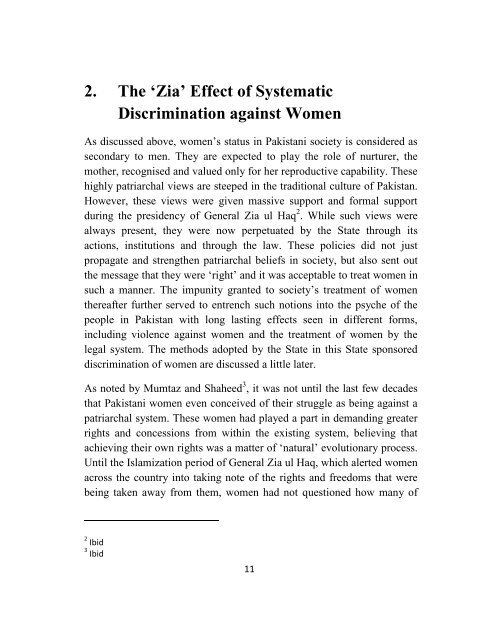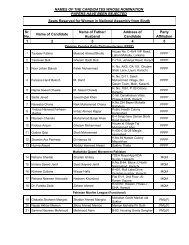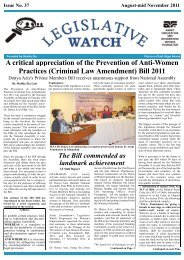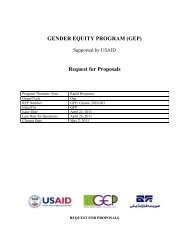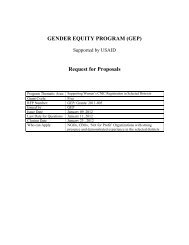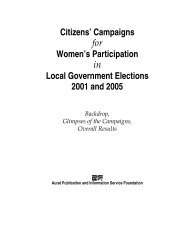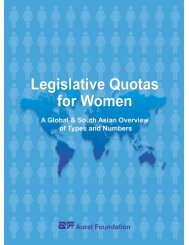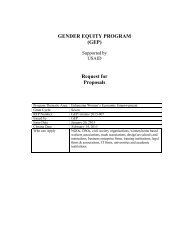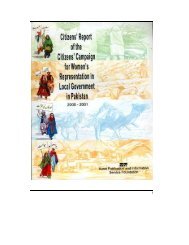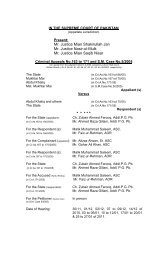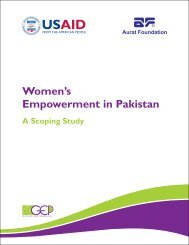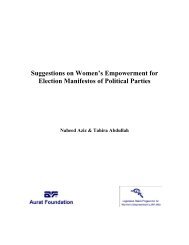'Honour Killings' in Pakistan and Compliance of ... - Aurat Foundation
'Honour Killings' in Pakistan and Compliance of ... - Aurat Foundation
'Honour Killings' in Pakistan and Compliance of ... - Aurat Foundation
- No tags were found...
Create successful ePaper yourself
Turn your PDF publications into a flip-book with our unique Google optimized e-Paper software.
2. The ‘Zia’ Effect <strong>of</strong> Systematic<br />
Discrim<strong>in</strong>ation aga<strong>in</strong>st Women<br />
As discussed above, women’s status <strong>in</strong> <strong>Pakistan</strong>i society is considered as<br />
secondary to men. They are expected to play the role <strong>of</strong> nurturer, the<br />
mother, recognised <strong>and</strong> valued only for her reproductive capability. These<br />
highly patriarchal views are steeped <strong>in</strong> the traditional culture <strong>of</strong> <strong>Pakistan</strong>.<br />
However, these views were given massive support <strong>and</strong> formal support<br />
dur<strong>in</strong>g the presidency <strong>of</strong> General Zia ul Haq 2 . While such views were<br />
always present, they were now perpetuated by the State through its<br />
actions, <strong>in</strong>stitutions <strong>and</strong> through the law. These policies did not just<br />
propagate <strong>and</strong> strengthen patriarchal beliefs <strong>in</strong> society, but also sent out<br />
the message that they were ‘right’ <strong>and</strong> it was acceptable to treat women <strong>in</strong><br />
such a manner. The impunity granted to society’s treatment <strong>of</strong> women<br />
thereafter further served to entrench such notions <strong>in</strong>to the psyche <strong>of</strong> the<br />
people <strong>in</strong> <strong>Pakistan</strong> with long last<strong>in</strong>g effects seen <strong>in</strong> different forms,<br />
<strong>in</strong>clud<strong>in</strong>g violence aga<strong>in</strong>st women <strong>and</strong> the treatment <strong>of</strong> women by the<br />
legal system. The methods adopted by the State <strong>in</strong> this State sponsored<br />
discrim<strong>in</strong>ation <strong>of</strong> women are discussed a little later.<br />
As noted by Mumtaz <strong>and</strong> Shaheed 3 , it was not until the last few decades<br />
that <strong>Pakistan</strong>i women even conceived <strong>of</strong> their struggle as be<strong>in</strong>g aga<strong>in</strong>st a<br />
patriarchal system. These women had played a part <strong>in</strong> dem<strong>and</strong><strong>in</strong>g greater<br />
rights <strong>and</strong> concessions from with<strong>in</strong> the exist<strong>in</strong>g system, believ<strong>in</strong>g that<br />
achiev<strong>in</strong>g their own rights was a matter <strong>of</strong> ‘natural’ evolutionary process.<br />
Until the Islamization period <strong>of</strong> General Zia ul Haq, which alerted women<br />
across the country <strong>in</strong>to tak<strong>in</strong>g note <strong>of</strong> the rights <strong>and</strong> freedoms that were<br />
be<strong>in</strong>g taken away from them, women had not questioned how many <strong>of</strong><br />
2 Ibid<br />
3 Ibid<br />
11


